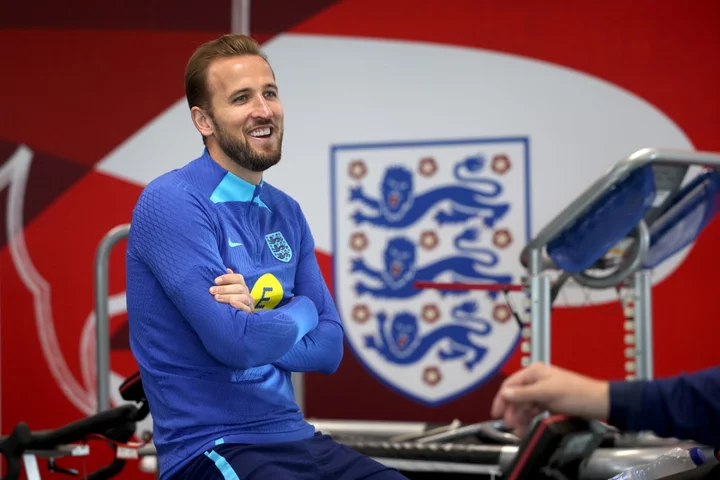
Harry Kane: ‘Ronaldo and Messi got better after 30 – my career is only at half-time’
Harry Kane doesn’t drink. He enjoyed Bayern Munich’s annual trip to Oktoberfest in full lederhosen and ate a giant pretzel, but his jug of beer was barely touched. At the hotel where he lives, meals are carefully planned by his chef: breakfast is an omelette or yoghurt and granola; lunch and dinner consists of salad and vegetables topped off by a rotating carousel of white fish, chicken or beef. Sometimes he has salmon as a treat. He lives away from his wife and children, in a country where he does not speak the language after only a handful of lessons, in a city he cannot enjoy without being mobbed. His family will move over but for now it is a solitary, unremitting existence: eat, sleep, play, recover, repeat. It is not quite the life of a monk, but when children dream of becoming England captain, they probably don’t dream of this. This, though, is sometimes the life of an elite footballer. He has climbed to the top of the game; he loves it here and he wants to stay. Kane is the sort of person who has it all mapped out, from his ambition to play in the NFL to his retirement in Surrey, where he is building a new family home. So when he says his career is only at half-time, aged 30, you know it is not just bluster but part of a considered masterplan. “The perception in sport is you hit 30 and people start to think that’s the end,” he says. “But the way I’m looking at it is that I almost have the second half of my career [to come]. I’ve had nine or 10 years at the highest level and I’m hoping for another eight or nine years at the highest level again.” His best years, Kane says, might still be ahead of him. “There is definitely room for improvement. When you look at a lot of the top-level players – Ronaldo, Messi, Lewandowski, Ibrahimovic – they have almost got better as they hit 30. In a lot of sports that happens. Everything is maybe settled in your personal life, you are comfortable with your body, you are comfortable mentally and that just allows you to focus on football.” Kane is sitting in a colourful side room at St George’s Park, where he is on England duty ahead of Friday’s friendly with Australia and a Euros qualifier against Italy next week. England teammates have been asking about life at Bayern, where Kane has made a fast start: nine goals and four assists in nine games. The manager Thomas Tuchel has come under scrutiny after one or two disjointed performances, with Bayern third in the table – Tottenham, ironically, are top of the Premier League. But Kane has impressed in these early weeks. “There’s a lot of other stuff that goes into a transfer – the personal stuff, trying to find houses, living in hotels, not having my family with me,” he says. “It’s all stuff I’m not used to. So to be able to have started the way I have, I’m really proud. I could have scored a few more goals, I’ve had quite a few chances. But if you’d have told me before the transfer this is what I’d be on, the amount of goals and assists and wins, I’d have taken that.” Football in Germany is well suited to longevity, with a winter break each season and one less cup competition to contend with than English football. Many players consider retirement from international duty to prolong their club careers, but in that sense it is almost the opposite with Kane. His workload has lightened, and he has no intention of ever turning down his country. “I will probably keep [playing for England] until I’m not picked anymore, and then accept that and take it on the chin,” he says. Might he lead England into a home Euros in 2028? “Who knows? Hopefully, I’m aiming to still be around by then. I feel as good as I’ve ever felt before and I’d like to think my career will go to my late thirties, at least.” Kane is a friend and admirer of Tom Brady, the oldest player to win the NFL’s MVP award, aged 40. As a teenager struggling on loan at Leicester City, Kane sat alone in a rented flat wondering how he was ever going to make it at Spurs when he couldn’t even get a game in the Championship. There he came across a documentary about Brady on YouTube, charting the quarterback’s rise from obscurity, and he felt inspired to chase his own dream. A decade on, Kane is back where it all started, spending plenty of time alone again, albeit in slightly smarter accommodation. It is a symptom of his determination to stay at the top of the game and to prove he belongs at one of the biggest clubs in the world. And perhaps what captures Kane’s unique mindset, what marks him out as one of England’s greatest ever footballers, is that he is never finished. “I definitely think there are levels [to reach],” he says. “Being at Bayern Munich now, I can keep pushing myself to see how good I can get.” To Kane, the second half has only just begun. Read More On this day in 2019: England lose long unbeaten qualifying record in Prague Harry Kane dreaming of leading England to Euro 2028 glory on home soil I am a Tottenham fan – Harry Kane wants Spurs to win Premier League Football rumours: Wayne Rooney in the running for Birmingham job ‘Role model’ David Beckham reached out after Hampden Park hounding, says Maguire Maguire reveals Beckham reached out during difficult England moment
1970-01-01 08:00
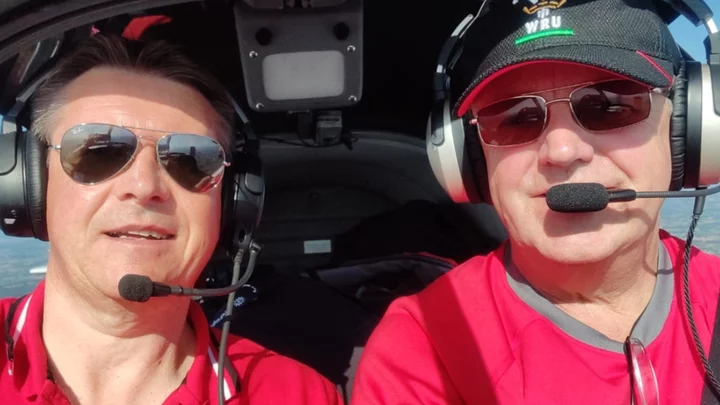
Rugby World Cup: The quirky ways Wales fans are travelling to France
From flying in a plane that weighs less than Wales' scrum to cycling more than 1,600 miles.
1970-01-01 08:00
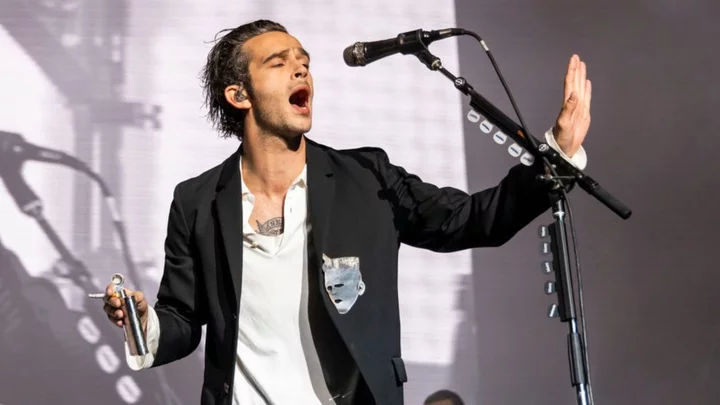
Matty Healy defends Malaysia kiss during 1975 concert in Dallas
The 1975 frontman read a prepared speech from his phone as the Dallas crowd cheered and applauded.
1970-01-01 08:00
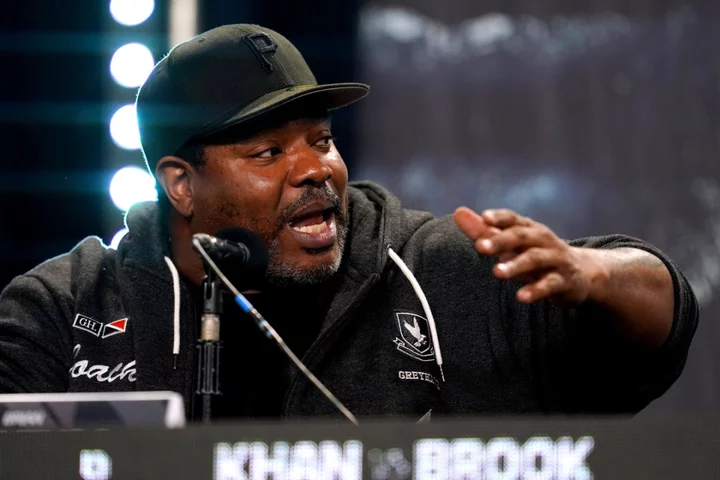
Terence Crawford coach Brian McIntyre reacts to suspended prison sentence for firearm possession
Boxing coach Brian McIntyre was handed a suspended 20-month prison sentence on Monday, after pleading guilty to possession of a firearm. “BoMac”, who coaches undisputed welterweight champion Terence Crawford among others, was arrested at Manchester Airport on Sunday 3 September, one day after guiding Chris Eubank Jr to victory over Liam Smith at the AO Arena. The American, 53, was detained by armed police after a scan of his checked-in luggage revealed the presence of a firearm and ammunition. A statement from Greater Manchester Police at the time said McIntyre was charged with possession of a firearm and possession of ammunition for a firearm without a certificate. On Monday 4 September, McIntyre attended Stockport Magistrates Court and was remanded in custody to await a sentencing hearing. On Monday (9 October), McIntyre pleaded guilty at Manchester Crown Court, where he received a 20-month sentence, suspended for two years. The news was first reported by journalist Oliver McManus, who added that Crawford was “one of a number of people to give in-person evidence”. The BBC reported that Judge Nicholas Dean KC said McIntyre was a “thoroughly good man” and that the “exceptional circumstances” of the case warranted a departure from the usual five-year minimum jail term. Dean said: “This is manifestly and obviously a case where it is appropriate to suspend the sentence.” Later on Monday, Crawford posted an Instagram photo of himself and McIntyre side by side, seemingly at Manchester Crown Court. On Tuesday (10 October), McIntyre wrote on Instagram: “Thank you HMP Birmingham Prison for your hospitality for the 5 weeks. All the guards and inmates was nice and cool, sorry I couldn’t stay longer but [due] to my outstanding legal team from the USA and London, I have to get back to work, woooorrrk tiiiimeeee!!!!!” In July, McIntyre was in Crawford’s corner for the American’s stoppage win over Errol Spence Jr, which saw Crawford become undisputed welterweight champion. Crawford’s performance was widely hailed as a masterclass, with many fans and pundits crowning the 36-year-old as boxing’s pound-for-pound No 1. Click here to subscribe to The Independent’s Sport YouTube channel for all the latest sports videos. Read More KSI vs Tommy Fury live stream: How to watch fight online and on TV this weekend Dillon Danis: Who is Logan Paul’s opponent in boxing match this weekend? Let’s get ready to rumble! Inside the ropes with boxing’s ring announcers
1970-01-01 08:00
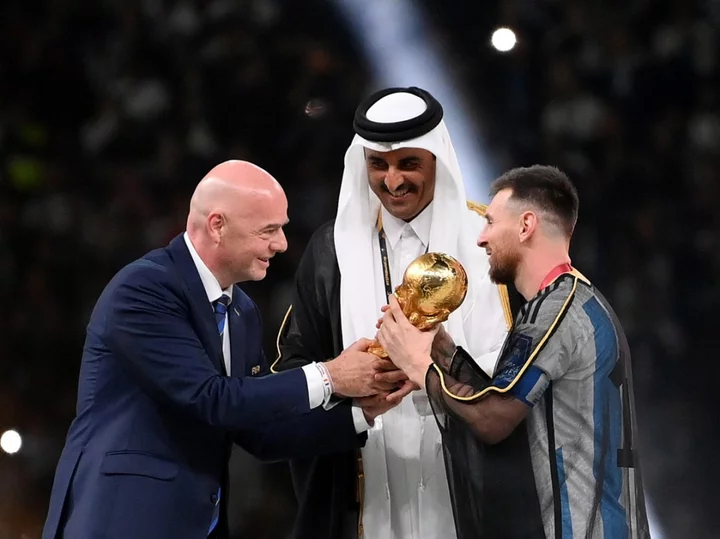
How Fifa and Uefa turned choosing tournament hosts into a ‘stitch-up’
It is only now, despite knowing for months, that those involved in the United Kingdom-Ireland Euro 2028 bid are excitedly talking about the reality of tournament football returning to these islands. There was a sense from inside the campaign of not wishing to tempt fate, given how previous bids have gone. That is despite the fact this has been a fait accompli for well over a year. And, even though this victory should be celebrated, it does provoke bigger questions over football politics, especially given the controversies over the 2018 and 2022 World Cup bidding processes and the reforms that followed them. Euro 2028 is one of potentially five consecutive European Championships and World Cups that will have had virtually no competition in the bidding processes. The 2028 bid has been won because Turkey finally withdrew. They were never likely to win due to their comparative lack of infrastructure, which is why they have joined up with Italy to bid for Euro 2032. That Mediterranean joint-bid is similarly the only candidate for 2032, after a prospective Russian campaign was ruled ineligible by Uefa due to the invasion of Ukraine. In echoes of the 2028 process, the Canada-Mexico-USA bid for the 2026 World Cup did face competition from Morocco, but the latter was seen as having no chance for the same reason as Turkey. The “United 2026” bid ended up getting more than twice as many votes as its African rival. That saw Morocco eventually join up with Spain-Portugal for 2030, in a move that was seen as “outmanoeuvring” the politically influential Saudi Arabian bid since it split the African vote. The Gulf kingdom was no longer confident of victory so didn’t want to go through defeat, withdrawing … temporarily. The only competitor at that point was the South American bid to celebrate the centenary of the inaugural Uruguay 1930 World Cup, which had an inspirationally romantic sway. They were instead co-opted into an unprecedented “global celebration” for 2030 by being allowed to host the first three games. Uruguay get the opening match as recognition of their status as 1930 host and champions Argentina get the second match as recognition of their performance as 1930 runners-up and major partner. Paraguay get the third match, doing very well out of being the base of the South American federation, Conmebol. While there is admittedly a similar romance to that solution, and it eliminates any politicking before such a symbolic tournament, it has one more questionable effect. Fifa’s continental rotation rules mean South America has given up the chance at 2034 – since no confederation can host competition fixtures in consecutive tournaments – for a mere three games. It’s quite the trade-off. As one involved figure said, “that’s football politics”. That only leaves countries from the Asian Football Confederation and Oceania Football Confederation eligible, and the former are already fully backing Saudi Arabia. Australia and New Zealand are, meanwhile, left scrambling to find at least three extra stadia that meet the 40,000 minimum capacity in time for the 31 October bid deadline. It already looks like the decision may well go to the member associations for mere ratification. That should pose much bigger questions for football governance since one of the crucial points after the farce of 2018-22 was to improve transparency. A key measure in this was supposed to be bringing the World Cup vote to the members. That may still happen by the letter of the rules, but the spirit of it all has felt somewhat different. If the post-2022 reforms were supposed to be about preventing backroom deals, what has happened here? “It’s clear it’s gone backwards in terms of democracy and bidding,” one centrally involved source said. Wider politics clearly plays an influential role here. After the game was split by the 2018 and 2022 votes, with the World Cup brought to effective autocracies, three successive tournaments are now going back to traditional Western European football powers. England is the biggest partner in 2028, enjoying its first full tournament since 1996. Spain is the biggest partner in 2030, enjoying its first full tournament since 1982. Italy is the biggest partner in 2032, set to enjoy its first full tournament since 1990. Bookending those three tournaments, then, are almost certain to be two of the true geopolitical powers. The USA is now seen by all of football as the priority market with the sport burgeoning there. Saudi Arabia has meanwhile targeted a huge expansion into the game as part of a wider political and economic project. The kingdom also enjoys an increasingly strong relationship with Fifa, and its investment funds were set to bankroll the original idea for the expanded Club World Cup. That plan has now settled into a 32-team event in 2025 in the USA, that Saudi Pro League clubs are targeting for a major statement as the next phase of their development. They want to help make it a competitor to the Champions League, increasing their own profile. The prize and participation money for that event have yet to be decided. There is obviously significant political intrigue to all of this, as well as a lot of accusations behind the scenes. Most of the major forces look to have got what they wanted without much pushback. Many sources talk of “horse trading” between the major nations. Others go so far as using words like “stitch-up”. Some smaller South American federations aren’t overly happy with the 2030 decision, especially with how having three automatic qualifiers – in the three host nations – immediately reduces the value of the highly lucrative qualification league, while denying the chance at a World Cup for 24 years. On the other side, some admit this situation may be better than random bids and huge amounts of money wasted on failed campaigns. A further importance to all of this is that, for all the power of the club game, the hosting of the World Cup is still seen as the most influential development in football. It usually dictates the game for a decade, if not longer. The latter could be seen in how USA 94 directly instigated huge American investment into football, as well as multiple ownerships that started with the Glazers. The decision to award 2022 to Qatar, then, was probably the most influential moment in modern football history. It directly caused regime change at Fifa and Uefa, changed the calendar, and was a factor in Qatar taking over Paris Saint-Germain and Saudi Arabia buying Newcastle United. It has undeniably played a part in Saudi Arabia seeking to host a World Cup, too. The regional rivalry means Mohammed Bin Salman wants his own tournament, before you get to the wider benefits. That speaks to the profound political power of the World Cup, as football increases its pervasiveness as the most popular cultural pursuit the planet has ever seen. It all comes as the tournament itself becomes so big that fewer and fewer countries can actually stage it. That has influenced these bidding processes too. So much of this serves as a metaphor for the game as a whole. And, at the end of it all, there is still pure beauty in how people get to watch these great magical events near them. All of Dublin, Glasgow, Cardiff will be thrilled. That, of course, is precisely why all of this has a power beyond emotion. Read More Saudi Arabia bid for 2034 World Cup strengthened after Australia and New Zealand hit hurdle Gareth Southgate questions ‘integrity’ of 2030 World Cup format 2030 World Cup will be hosted by six countries across three continents, Fifa announces Euro 2028: Will host nations get automatic qualification? Cardiff, Glasgow, Dublin... The Euro 2028 final should be staged anywhere but Wembley UK and Ireland name 10 venues for Euro 2028
1970-01-01 08:00
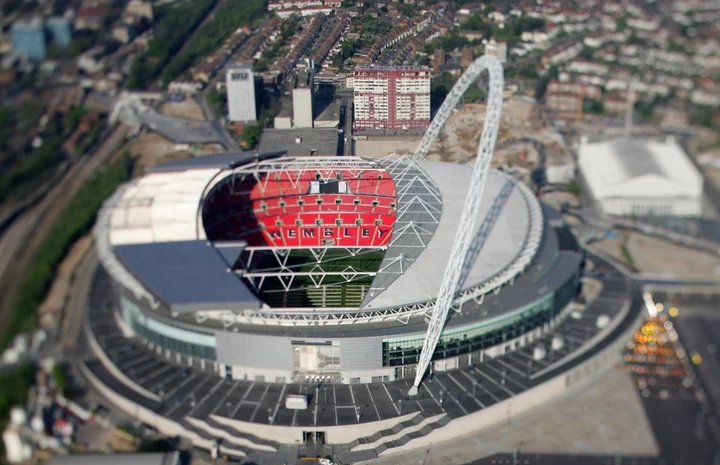
Cardiff, Glasgow, Dublin... The Euro 2028 final should be staged anywhere but Wembley
You already know where the Euro 2028 final will be played. You don’t know know because it hasn’t been announced yet. But when I tell you that the UK and Ireland are hosting the tournament, and when I show you the list of 10 allocated venues, then you already know. Wembley is the biggest stadium in the best-connected city of the largest host nation. It is the greatest revenue generator. It is the sort of stadium that assumes it will host a final, the sort that thinks other venues wouldn’t want all that pressure and attention anyway. The English FA will pull rank here and that is understandable, to an extent. After all, Wembley can call upon history and experience, the site having hosted three European Championship finals before: one at the old Wembley in 1996, and both the men’s and women’s finals at the new Wembley in 2021 and 2022. But the last men’s final – and this is a crucial detail – ended in literal invasion. The report on what happened that July day is harrowing, describing a horde of 6,000 mindless thugs rampaging through security lines and terrifying ordinary ticket holders. On their way they beat police officers, knocked over a young girl and trampled over a man sending him into seizure. One insurgent hijacked a boy in a wheelchair, separating him from his father, so he could gain access pretending to be a steward. Italians were subjected to random attacks, and the report makes clear that there probably would have been deaths had it not been for England’s defeat and a late downpour of rain which combined to dampen the atmosphere. It should be said here that the report did not lay blame at Wembley’s steps, specifically; rather it was a perfect storm of lockdown energy, summer heat, sporting tribalism, nationalist sentiment, drugs, alcohol, the internet and a unique gathering of goons gripped by herd mentality. But if ever there was a red flag for hosting a European Championship final, hosting a disastrous European Championship final might be it. It feels like an almost dangerously radical thought, but what if the Euro 2028 final wasn’t held at Wembley Stadium? Wembley hardly showcases the best of these isles. The immediate area has the personality of an airport terminal, and while the stadium was once a state-of-the-art bowl, it is not even the best in London these days given what Tottenham have built. Admittedly, the options are limited. Anfield’s pitch is too small for Uefa’s liking, Old Trafford too decrepit to be used. Everton’s unbuilt stadium made the final list along with Birmingham’s Villa Park, Manchester’s Etihad Stadium and St James’ Park in Newcastle, and the Etihad would be the most obvious of those to host a showpiece event. Then there are the four stadiums beyond England. The redevelopment of Belfast’s Casement Park is still just a saved file on an architect’s hard drive, and it would only be around 34,000 capacity. But the others are viable alternatives to host a final. Hampden Park is a tired venue but there are plans for much-needed regeneration ahead of Euro 2028. Glasgow is a city that gets its edge and its energy from football, and it knows how to throw a party. As does Dublin, and its Aviva Stadium has hosted everything from the Europa League final and international rugby games to Taylor Swift concerts. Personally, I would choose the Principality Stadium in Cardiff. Wales enjoyed a rekindled love affair with football during the Bale era, ignited by their run to the semi-finals of Euro 2016. Football has overtaken rugby as the country’s most popular sport and the Wrexham story is adding momentum. It is the next biggest option after Wembley with 74,000 seats, and the stadium sits near the heart of the city only a short walk from Chippy Lane, one of the great cultural institutions of this country. Tournament mission statements are always lukewarm sentiments and Euro 2028 is no exception, but if organisers really want to “engage new fans”, then staging the final in Wales would fit that brief. All this is likely wasted breath. The early signs are that Cardiff may stage the opening game but Wembley will host the final and both semi-finals, too. The English FA says it has learnt lessons from the past, and Uefa recently dismissed concerns when its president Aleksander Ceferin said that those violent scenes “could have happened anywhere”. Uefa lost £700m in revenues during the pandemic and needs a sure thing like Euro 2028 to guarantee a profitable tournament. Wembley is a significant part of that appeal. It is the biggest stadium, in the biggest city. But it is also the scene of unbridled anarchy only two years ago, and perhaps that is as good an excuse as any to spread the wealth. Read More FA reveal tournament plans after UK and Ireland confirmed as Euro 2028 hosts Euro 2028 venues: UK and Ireland name 10 stadiums as Anfield and Old Trafford miss out Euro 2028: Will host nations get automatic qualification? UK and Ireland name 10 venues for Euro 2028 FA reveal tournment plans after UK and Ireland confirmed as Euro 2028 hosts
1970-01-01 08:00
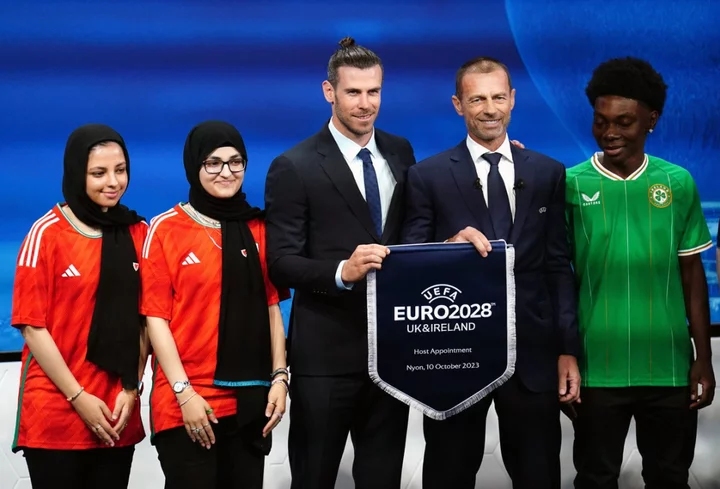
FA reveal tournament plans after UK and Ireland confirmed as Euro 2028 hosts
The hosts of Euro 2028 will be the United Kingdom and Republic of Ireland after a joint bid across the five nations was confirmed by Uefa on Tuesday. Following a meeting of Uefa’s Executive Committee, the UK and Ireland was awarded the 2028 tournament in a rare five-association partnership, The UK and Ireland bid delegation included six football youth ambassadors who support the development and diversity of the game as well as a presentation by the five Football Association leaders and former Wales captain Gareth Bale. Euro 2028 will be the largest major sporting event ever held across all five nations and is set to be a commercial success, delivering record crowd numbers at famous venues. There will be approximately three million tickets available, which is more than any previous European Championship, and with an average stadia capacity of 58,000 more fans than ever will be able to attend matches in person. The FA also estimates that 2.5m fans will take part in Uefa’s fan festivals across the UK and Ireland during the tournament which will have a renewed focus on sustainability. A compact and connected transport plan is being drawn up to ensure that more than 80 per cent of ticket holders are able to travel to matches by public transport and the proposed match schedule aims to reduce and limit emissions for fans attending the games. There will also be a personal carbon footprint tracker for every spectator. Euro 2028 is also predicted to generate socio-economic benefits of up to £2.6bn for the UK and Ireland with the bid partners already investing more than £500m - between 2019 and 2025 - to improve and upgrade grassroots facilities. A further £45m legacy fund will be invested to develop football and create additional benefits as the tournament approaches. However, there are still issues to resolve over the next five years however with agreement still to be reached on who will fund the redevelopment of Casement Park - Northern Ireland’s host stadium. Plans for a 34,000 stadium have been delayed by legal challenges and are further complicated by the lack of a functioning Executive at Stormont. Costs have also risen from an original estimate of £77.5m to more than £100m. England will be involved in hosting a Euros for a third time having hosted alone in Euro 96 and were one of 11 countries involved in staging the continent-wide Euro 2020. All five nations are expected to go through qualification for the tournament, with Uefa reserving two host nation places for any of the teams which do not make it on merit. Read More UK and Ireland confirmed as joint hosts of Euro 2028 UEFA picks UK-Ireland to host soccer's 2028 European Championship. Italy-Turkey to stage Euro 2032 Uefa torn over plans to reinstate Russian youth teams Ukraine urges other nations to boycott playing Russia after Uefa decision Earps thanks fans after England GK jersey sells out in hours Saudi Arabia targets two European clubs ‘similar in size’ to Newcastle
1970-01-01 08:00
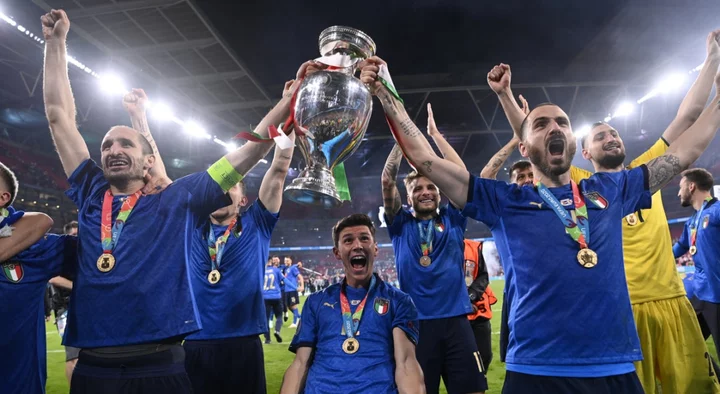
Euro 2028 LIVE: Uefa announce UK and Ireland as hosts - with Euro 2032 location also confirmed
The United Kingdom and Ireland are set to be announced as the hosts for Uefa Euro 2028 with another joint bid between Turkey and Italy the likely destinations for the 2032 edition. Uefa still need to grant official approval to the bids, which have so far been unopposed, when they meet Switzerland on Tuesday. Ten stadiums across the UK and Ireland are set to play host to Euro 2028 with Wembley Stadium (London), Principality Stadium (Cardiff), Hampden Park (Glasgow), Aviva Stadium (Dublin), and Casement Park (Belfast) all named as venues in the bid. The final is due to be held at Wembley, the same location where the Lionesses won the 2022 Euros and where the men lost to Italy in the 2020 Euro final. Germany host the competition next year after the previous edition was held in 2021 due to the Covid-19 pandemic. Follow along with all of the latest updates as the 2028 and 2032 hosts are announced. Read More Euro 2028 venues: UK and Ireland name 10 stadiums as Anfield and Old Trafford miss out UK and Ireland set to host Euro 2028 after Turkey withdraw bid Saudi Arabia bid for 2034 World Cup strengthened after Australia and New Zealand hit hurdle
1970-01-01 08:00
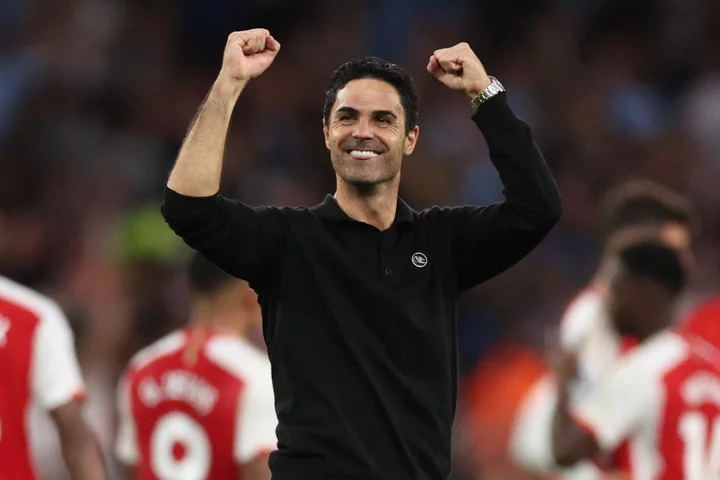
Arsenal ran out of steam last season – but this is a very different Mikel Arteta team
As long as 30 minutes after the game, and at least 30m from the Arsenal dressing room, you could still hear the raucous celebrations inside. The cheers were especially audible as the door to the media room swung open and Mikel Arteta came in for his press conference, when he eventually allowed himself to smile – and quite widely. “A great feeling,” the Arsenal manager said after his side’s 1-0 win over Manchester City, which represented his first points against his former employers, not to mention his club’s first points at all against the champions since April 2017. “You could sense, it’s been so many years without beating them. “They were all dancing and super happy. They go into the international break and the mood is much better. They’re gonna have a few days off, the ones who are not involved, and it just sends everybody away until the next game against Chelsea with the right feeling. It’s great so I’m really happy.” If these sound like the sort of scenes usually reserved for when a trophy is won, that is kind of the point. It’s all about taking this team closer to that first Premier League since 2004. Arteta has taken them step by step over the last four years, and we’re now at the point where it’s truly decisive moves rather than the earlier strides. It was why this was so important. If you are going to actually beat a team as powerful as this Manchester City in the title race, you obviously need to beat them on the pitch, and in the league. Arteta naturally tried to play down its exact psychological significance, but he couldn’t but admit this was important. His interpretations of previous games were maybe a bit generous but that was understandable. “I don’t know if it was a barrier. Obviously it was something we needed to go through. To beat them we have to lose against them, we have to lose probably the way we lost at the Etihad. The team showed a real maturity today, that comes from experiences. Sometimes you need that to become a better team.” That is probably what Arsenal are, even if their points return is worse than this point last season. They are clearly a more substantial team, with more conviction, as a season like last year will ensure. It was an arrival, even if it ended in frustrating fashion. It ultimately proved Arsenal are at that level again. The summer signings have since been about giving them more dimensions. It is one of the more interesting elements of Arsenal’s start to the campaign, as well as what might have been lift-off for Kai Havertz. Arsenal clearly hit on a superb first XI last season, which propelled their campaign for months. The issue was it eventually left Arteta in a bind. He could either persevere with the XI, at the cost of energy given how little they were rested, or he could change up but also remove some of the verve. He tried to do a bit of both in the end, and they somewhat inevitably ran out of steam. Since then, Arteta has obviously been trying to give them more depth, but also variety. Havertz was about exactly this. Arteta will especially enjoy his contribution, the pass to Gabriel Martinelli for the goal coming as it did just minutes after the German came on. It looked simple but was about his spatial awareness and presence of mind. The effect of just doing that can’t be discounted either – as with the win. Arsenal will believe, even more than before. Nobody should believe this is going to be the City for the rest of the season of course. They have some huge absences, especially with Rodri and Kevin De Bruyne. They will return and both the team and Erling Haaland will inevitably go on the sort of run they did last season at least once. Arsenal should be more equipped to go that bit further, to get more points. That was what the celebrations felt like they were about, at least in part. The team is that bit closer to completion. Read More Mikel Arteta hails ‘fantastic’ young Arsenal side as they break Man City hex Arteta provides Saka injury update and rules Arsenal star out for England Arsenal boss Mikel Arteta hails ‘maturity’ of young Gunners after City win Gabriel Martinelli snatches last-gasp victory for Arsenal against Man City Fortune favours Arsenal as Mikel Arteta finally outdoes Pep Guardiola Pep Guardiola says he learned ‘a lot’ from Mikel Arteta ahead of Sunday reunion
1970-01-01 08:00
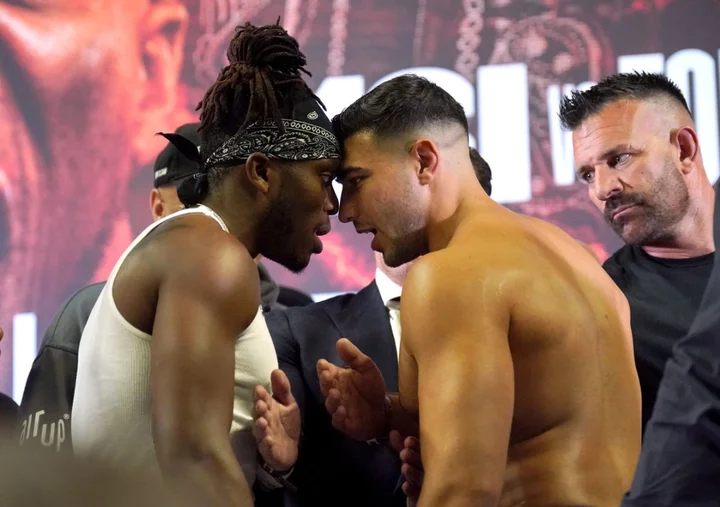
KSI vs Tommy Fury live stream: How to watch fight online and on TV this weekend
KSI and Tommy Fury will meet in the boxing ring on Saturday, in what is set to be one of the biggest fights of the year. KSI (real name Olajide Olatunji) rose to fame on YouTube and has since ventured into rapping, boxing and business – the latter via his Prime energy drink company, which he launched with former opponent Logan Paul. The Briton’s next in-ring challenge comes against compatriot Fury, a former Love Island contestant and the half-brother of heavyweight boxing champion Tyson Fury. Neither KSI, 30, nor Fury, 24, has been beaten – though the latter has greater professional experience. In the co-main event, Paul will be in action against fellow American Dillon Danis, a former teammate of UFC star Conor McGregor. Here’s all you need to know. We may earn commission from some of the links in this article, but we never allow this to influence our content. This revenue helps to fund journalism across The Independent. When is the event? The fights are set to take place on Saturday 14 October at the AO Arena in Manchester. The main card is due to begin at 7pm BST (11am PT, 1pm CT, 2pm ET). Paul vs Danis is likely to take place at around 10.30pm BST (2.30pm PT, 4.30pm CT, 5.30pm ET), with ring walks for KSI vs Fury expected at 11.30pm BST (3.30pm PT, 5.30pm CT, 6.30pm ET). How can I watch it? The event will air live on Dazn pay-per-view, at a cost of £19.99 in the UK and $54.99 in the US. If you’re travelling abroad and want to watch the event, you might need a VPN to unblock your streaming app. Our VPN round-up is here to help and includes deals on VPNs in the market. Viewers using a VPN need to make sure that they comply with any local regulations where they are and also with the terms of their service provider. Odds KSI – 5/2; Fury – 2/7 Paul – 2/9; Danis – 3/1 Full odds via William Hill. • Get all the latest boxing betting sites’ offers Full card (subject to change) • KSI vs Tommy Fury • Logan Paul vs Dillon Danis • Salt Papi vs Slim Albaher • Deen The Great vs Walid Sharks II • King Kenny vs Anthony Taylor • Whindersson Nunes vs My Mate Nate • NichLmao & Alex Wassabi vs Luis Alcaraz Pineda & BDave • Astrid Wett vs Alexia Grace • Swarmz vs Ryan Taylor II • Chase DeMoor vs Tempo Arts S-X vs DTG Read More Who is KSI? From ‘endearing’ class clown to YouTuber who has changed the face of boxing Tommy Fury explains why he has ‘never been fan’ of KSI ahead of crunch boxing match Let’s get ready to rumble! Inside the ropes with boxing’s ring announcers What time does Logan Paul vs Dillon Danis start this weekend? How to watch Logan Paul vs Dillon Danis online and on TV this weekend What time does KSI vs Tommy Fury start this weekend?
1970-01-01 08:00
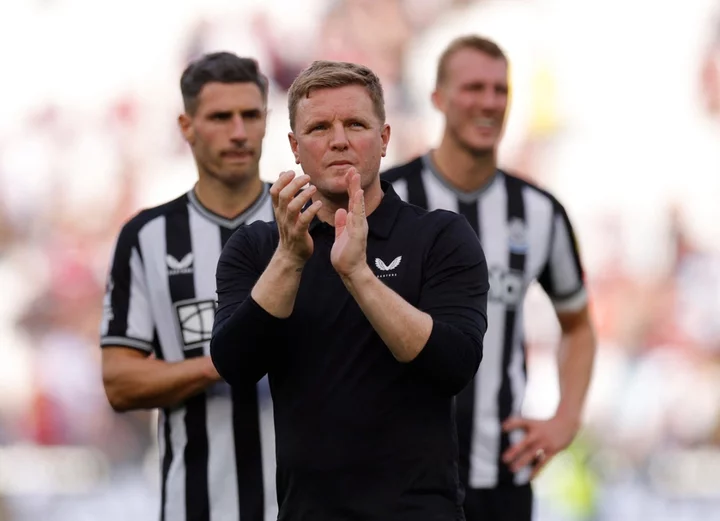
Newcastle enter international break buoyant despite late mistakes at West Ham
So vertiginous were the heights scaled by Newcastle on Wednesday, with their 4-1 dismantling of Paris Saint-Germain, it was almost inevitable that Eddie Howe's men would be brought down to earth at the London Stadium, forced to dig deep to eke out a result against a resilient West Ham. The Magpies could have picked up a fifth straight win, in fact, had a brilliant late equaliser from Hammers’ substitute Mohammed Kudus not rescued a point for the home team. It was a fair result. Where Newcastle were full of cunning and elan against PSG, here on a sunny Sunday in east London they were visibly running on empty, deservedly going into the break 1-0 down. West Ham, like their opponents, had been in action midweek, but David Moyes was able to make five changes from their 2-1 win at Freiburg. No such luxury for Howe: Sven Botman, Joelinton, Joe Willock and Harvey Barnes all remain on the treatment table, while Callum Willson – scorer of 12 goals in 13 games against West Ham over the years – was reduced to a late cameo here, so determined is the manager not to rush his No 9 back from injury. That they were stretched showed right from the outset. Gone was the usual high intensity; in its stead was a lethargy that allowed Emerson Palmieri in on the left, with Jamal Lascelles caught out of position. The Italian international was able to nip the ball beyond Nick Pope, the Newcastle keeper having hurtled off his line, before squaring to Tomas Soucek for an easy tap in. It was the defibrillator the game needed. The Europa Conference League champions were buoyant, with James Ward-Prowse winning the midfield battle and 33-year-old Michail Antonio, back in the side after a hip injury, causing problems for a defence that had kept Kylian Mbappe at bay only a few days earlier. Newcastle, on the other hand, continued to stumble soporifically through the first 40 minutes. There was no composure. No urgency. When Sean Longstaff lofted a pass into the stands, most Newcastle fans would have settled for a point there and then. Bruno Guimaraes, so often the fulcrum around which Newcastle operate, was not on his game – and was very fortunate to still be on the field. The Brazilian was booked for tripping Emerson; 90 seconds later, he somehow evaded a second card for scything down Ward-Prowse. Even Alan Shearer, on Match of the Day, admitted Guimaraes should have seen red. As half-time approached, though, the visitors began to show flickers of life. Miguel Almiron, cutting in from the right, curled a rasping shot just over the crossbar. Soon after, the Paraguayan won a free-kick from which Dan Burn’s glancing header slipped narrowly wide of the post. But Howe’s verdict was accurate: “Really tough first half for us,” he said. “We weren’t ourselves. We just didn’t have much rhythm in the game.” They regained some after the interval. Kieran Trippier increasingly found himself in space down the right, while Guimaraes was now in his groove, adding vim and ballast to the midfield. The passing was crisp; Newcastle’s confidence grew. Even more so after Edson Álvarez headed wide for West Ham from Ward-Prowse’s corner. When Alphonse Areola was called upon to make a fine save to deny Burn after the left back climbed to meet Alexander Isak’s beautiful dink to the far post, an equaliser seemed nigh. It was. Lucas Paquetá was adjudged to have fouled Bruno Tonali – a decision that left Moyes furious – and Trippier's resulting free kick fell to Isak via Alvarez’s clearing header. The Swede made no mistake, calmly slotting past Areola. He had his second shortly after. Guimaraes, collecting the ball infield, sprayed a sublime 30-yard pass to the right to Trippier, whose volleyed cross was even better, leaving Isak with the simplest of finishes. It was Newcastle at their free-flowing best. As “Geordie boys, taking the p**s”, rang out from from the away end, West Ham looked rattled, their defence yanked out of shape. Isak, whose performance Howe described as “magnificent”, should have had a hat-trick and taken his tally for the season to eight, level with Manchester City’s Erling Haaland. Put through by Burn, the 24-year-old rounded Areola but saw his shot from an acute angle ricochet off the post. Naturally, it was a turning point. As was the case when the Toon lost 2-1 to Liverpool in the dying moments at the end of August, Newcastle’s profligacy came back to haunt them. In the last minute of normal time, Kudus, signed from Ajax for £37m in the summer, popped up on the edge of the box to smash the ball past a despairing Pope. That the Ghana forward was able to get his shot away despite a heavy first touch – Tonali failed to get a block in – was clearly a source of irritation for Howe. “I’m really disappointed we didn’t get over the line,” he said. “We’ve made a couple of mistakes and got punished.” Certainly, if Newcastle are to replicate their success of last season, they will need to improve at seeing out games. Still, it's a measure of how imperious they have been since losing 3-1 at Brighton before the last international break that a point away at seventh-placed West Ham seems like a missed opportunity. “It’s been a brilliant spell for us,” said Howe, whose side are now unbeaten in seven, having won five of those matches. “When you go back to the Brighton game, there was a response needed. We needed to come back after the break and build our confidence back and get results. We’ve done that and some really.” For David Moyes, whose side were eviscerated 5-1 in last season’s corresponding fixture, there were plenty of positives, particularly the character they showed right to the end. “I’m actually quite pleased with a point,” he admitted. Come the end of the season, you’d expect, on reflection, Newcastle fans will feel the same. Read More West Ham United vs Newcastle United LIVE: Premier League result, final score and reaction Eddie Howe says becoming Newcastle head coach was ‘life-changing’ Newcastle defender Tino Livramento returns to England Under-21s squad
1970-01-01 08:00
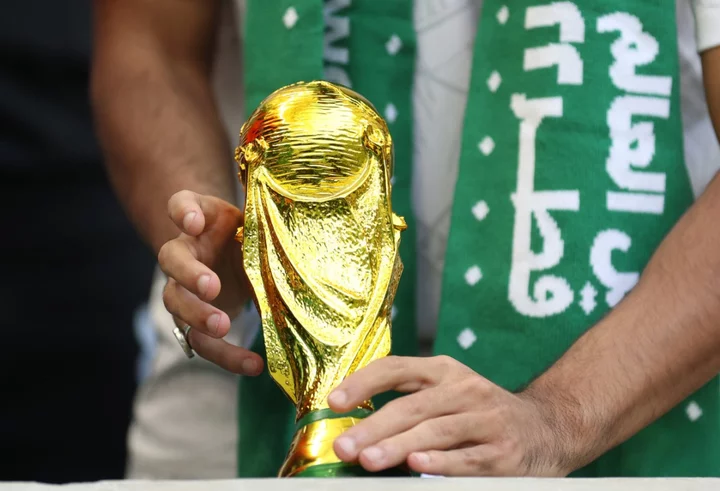
Saudi Arabia bid for 2034 World Cup strengthened after Australia and New Zealand hit hurdle
Australia and New Zealand are scrambling to come up with solutions to name the 14 stadiums necessary for a World Cup 2034 bid in time for the 31 October deadline, potentially clearing the way for Saudi Arabia even more. Fifa's requirements state that all of the stadiums must have a capacity of at least 40,000 seats, but there are currently only 11 that fit that profile across the two countries. What's more, some of the Australian stadiums that meet the criteria are cricket ovals, with sightlines that aren't really suitable for football. The bidding documents do state that only four of the named venues need to be "existing stadiums" but it is naturally asking a lot to secure construction commitments in the 26 days between the bidding process opening and closing. The circumstances have brought further commentary within the game that the 2034 bidding has almost been set up as a fait accompli for Saudi Arabia, and they had their potential bid ready to go once the process was announced. With Jordan Henderson and Saudi Pro League players backing the bid. The country is currently undergoing a huge sporting expansion, and staging the World Cup is seen as a huge part of Mohammed Bin Salman's 'Vision 2030'. Although the 2030 event had initially been the target, Saudi Arabia was politically outmanoeuvred by the initial Portugal-Spain bid, as Morocco was brought in to split the African vote. The fact it was the centenary of the competition only strengthened the idea of a cross-continental event, with Uruguay, Argentina and Paraguay subsequently brought in for the opening games. Saudi Arabia instead decided to shift all energy to a 2034 bid, in which the rules behind continental rotation mean that World Cup can only be held in Asia or Oceania. It makes Australia-New Zealand the only likely competitor for 2034, although with increasing complications. A statement from Football Australia CEO James Johnson read: “As stated previously, Football Australia is exploring the possibility of bidding for the 2029 Fifa Club World Cup and/or the Fifa World Cup 2034. We acknowledge Fifa’s communication regarding the Fifa World Cup 2034 and we are encouraged that after the hugely successful Fifa World Cup Qatar 2022 and Fifa Women’s World Cup Australia and New Zealand 2023, the football family of Asia and Oceania will once again have the opportunity to showcase their ability to welcome the world and host the best Fifa tournaments.” The reference to the Asia football family has been interpreted as instructive by involved figures. Another complicated solution for Australia and New Zealand is to potentially bring in a third partner, but that would inevitably have to be a country from thousands of miles away in the Asian Football Confederation. It is understood that the body have made it clear Saudi Arabia is their preferred choice, putting off any bid from Japan and Korea. The prohibitive circumstances also illustrate how limiting a 48-team competition is going to be in finding hosts in the future. Read More 2030 World Cup will be hosted by six countries across three continents, Fifa announces FIFA set to approve letting Russian youth soccer national teams return to competition Gareth Southgate questions ‘integrity’ of 2030 World Cup format Fifa clears the way for Saudi Arabia to host 2034 World Cup Jordan Henderson plays the tool on road to Saudi Arabia’s inevitable World Cup Gareth Southgate positive about UK and Ireland bid for Euro 2028
1970-01-01 08:00
